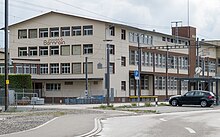claro fair trade
| claro fair trade AG
|
|
|---|---|
| legal form | Corporation |
| founding | 1977 |
| Seat | Orpund , Switzerland |
| management |
|
| Number of employees | 65 (June 30, 2013) |
| sales | 17.9 million CHF |
| Branch | Trade organization |
| Website | www.claro.ch |
The claro fair trade AG , shortly claro called, is a Swiss trading company based in Orpund near Biel.
The company trades in food and handicrafts that are manufactured in the south of the world according to the criteria of fair trade ( FLO , WFTO ). In addition to supplying the claro publishing houses, the company re-exports around 50 percent of its purchases and, alongside Gepa , Fair Trade Organization and Oxfam, is an important partner in the control and regulation of fair trade . Investigations and static analyzes of the fair trade economy name the company as a supplier of figures immediately after the German Gepa.
history
On June 22, 1977, following the Berne Declaration, the import company OS3, Organization Suisse Tiers Monde, was founded with its headquarters in Sonceboz . The first producer organization the company worked with is Corr - The Jute Works in Bangladesh. It makes jute bags that helped spark the fair trade movement in the 1970s.
In the years that followed, the range was gradually expanded to include products from third world countries, for example coffee from Tanzania , tea from Sri Lanka and cane sugar from the Philippines. In 1985, the company came into contact with the Bolivian organization El Ceibo , from which it obtained cocoa from then on. In search of other uses and sales opportunities for cocoa and sugar, claro developed the first fair trade chocolate together with the Swiss chocolate manufacturer Chocolat Bernrain and launched it in 1991. As a founding member of the European Fair Trade Association (EFTA), which was founded in 1990 , the company took on an important role in the definition of fair trade criteria and standards. It later also played a key role in the establishment of the Swiss Forum Fairer Handel, the Swiss umbrella organization for fair trade , which today operates as Swiss Fairtrade. In 1997 the import cooperative OS3 was transformed into the stock corporation claro fair trade AG. In the same year the Fairtrade Labeling Organizations International (FLO) was founded.
Products
The best-known product is the fair-trade chocolate Mascao , which has been produced since 1991 and is made from certified organic raw materials. The company also trades in other products. Most of the food bears the Max Havelaar seal of approval .
Food
- Coffee: espresso, coffee, decaf coffee, specialty coffee
- Tea: black tea, green tea, rooibos, white tea, herbal tea, spiced tea
- Cocoa products: chocolate bars, cocoa powder, sugar-coated products (raisins, almonds, Brazil nuts)
- Spices and herbs: various types of pepper, curry , nutmeg , vanilla , cardamom , turmeric , ginger , cumin , coriander , cloves , mustard seeds , cinnamon , za'atar
- Juices and concentrates: orange juice, mango juice, fruit nectar and various fruit syrups
- Honey (traditional honey), jam, spread
- Sugar (mascobado) and sweeteners
- Muesli and flakes
- Rice, cereals, quinoa
- Dry fruits, nuts, seeds
- Pastries and sweets
Handicrafts
- Jewellery
- Handbags, shopping baskets
- Scarves and other fashion accessories
- Cooking utensils, ceramics, baskets and other home accessories
- toys
Sales structure
In Switzerland, the fair trade products are mainly available in claro shops, world shops , Magasins du Monde (western Switzerland), Botteghe del Mondo (Ticino), in organic shops, health food stores and in retail outlets. Outside Switzerland, the fair trade chocolate is best known, which is sold in 18 countries through EFTA partners and Alternative Trading Organizations (ATO).
See also
Web links
- Official website
- Inventory: claro fair trade AG in the finding aids of the Swiss Social Archives
Individual evidence
- ^ Entry of "claro fair trade AG" in the commercial register of the Canton of Bern
- ↑ a b c Annual Report 2008/2009 . Archived from the original on March 1, 2011. Retrieved July 19, 2010.
- ↑ Who benefits ?: a social assesment of environmentally-driven trade in Google Book Search
- ↑ a b Fair trade: market-driven ethical consumption in the Google book search
- ^ Economic analysis of eco-labeling in the agricultural sector of Thailand and the Philippines in the Google book search
- ↑ https://www.claro.ch/de/shops

